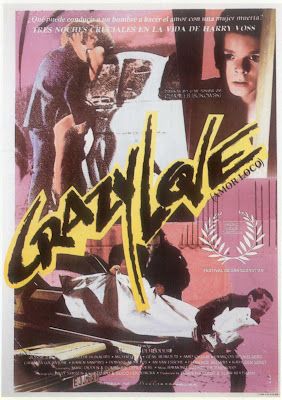 A whacked-out yet heartfelt Belgian import, this is a lush and romantic film about masturbation, physical deformity and necrophilia that plays like the most demented Frank Capra movie ever made. Despite—or maybe because of—its grotesqueries, CRAZY LOVE is perhaps the ultimate movie about loneliness and isolation: simple, direct and quite moving.
A whacked-out yet heartfelt Belgian import, this is a lush and romantic film about masturbation, physical deformity and necrophilia that plays like the most demented Frank Capra movie ever made. Despite—or maybe because of—its grotesqueries, CRAZY LOVE is perhaps the ultimate movie about loneliness and isolation: simple, direct and quite moving.
This 1987 film began life as a short adapted from the story “The Copulating Mermaid of Venice, CA” by the late Charles Bukowski, about a drunk who finds love in the arms of a corpse. The film was later expanded to feature length with the addition of two additional segments, the second of which was based on a portion of Bukowski’s autobiographical novel HAM ON RYE. CRAZY LOVE (initially released in the US as LOVE IS A DOG FROM HELL) is arguably the finest screen adaptation of the author’s work to date; far from a literal transcription, debuting filmmaker Dominique Deruddere meshed Bukowski’s famously hard-boiled aesthetic with his own decidedly unBukowski-like sensibilities. The resulting film was given high marks by the author himself, who was quite vocal in his dislike of Marco Ferrari’s TALES OF ORDINARY MADNESS and Barbet Schroeder’s BARFLY, the other feature adaptations of his writing.
CRAZY LOVE may well be, as the DVD cover blurb proclaims, “The most astonishing film debut since David Lynch’s ERASERHEAD”, but Deruddere, unlike Lynch, has yet to live up to it. Deruddere’s subsequent films have included the 1989 John Fante adaptation WAIT UNTIL SPRING BANDINI (produced by Francis Ford Coppola, who shepherded CRAZY LOVE’S initial US release), the sex thriller SUITE 16 (1994) and the Oscar nominated EVERYBOY’S FAMOUS (2000).
Part one: a young boy sits in a movie theater, transfixed by the intensely romantic drama unfolding on the screen. He’s so taken with the film he steals a still of its young starlet from the theater lobby. The boy later attends a carnival with his older friend, who sets him up with a willing girl on a ride; the boy, however, doesn’t respond to her advances. A bit later the boy and his friend break into the house of a randy carnival hand, where the boy is encouraged to ravish the woman while she sleeps; he seems to be having a bit of luck in this endeavor, but the woman abruptly wakes up and sends both boys running out of her house, screaming. That night the boy masturbates for the first time, with rain drops reflected on his face like tears running down his cheeks.
Part two: the boy is now a teenager with hideous boils covering his face and most of his body. This makes him an outcast among his fellow teens, particularly the girls. Attending his school graduation dance, he catches the eye of a pretty blonde. He enters the bathroom, wraps his face in toilet paper and hits the dance floor in his new guise, where his confidence is bolstered and he gets the blonde to dance with him. By the end of the night, though, he ends up drunk and alone.
Part three: the protagonist is now an alcoholic derelict, attending another dance held in a sleazy bar. He’s alone, naturally, but spots an old buddy (possibly the same friend he was seen paling around with in his younger incarnations) and the two decide to make trouble. Finding a hearse parked near the bar, they steal the corpse it’s housing, which turns out to be the carcass of a beautiful young woman (the same woman, eagle-eyed viewers will note, the boy masturbated to in part one). They take the body back to one of their houses, where the protagonist finds himself smitten; he tenderly mounts the body, in which he finds his lifelong ideal of romantic love finally satisfied. He decides to “marry” the corpse, a union he seals by carrying it into the ocean…where both disappear.
You won’t see anything else quite like CRAZY LOVE, and a large part of its effectiveness is due to the brilliance of Dominique Deruddere’s filmmaking. Leaving realism far behind, Deruddere directs in a lush, dreamy fashion that explicitly recalls Hollywood melodramas of the forties and fifties but still retains a deeply modern sensibility (making it a better film, I believe, than Todd Haynes’ similarly styled FAR FROM HEAVEN). To be sure, you probably won’t find masturbation or necrophilia in any old time Hollywood movies, or at least not as graphically portrayed as they are here. The sequence where the protagonist appears on the dance floor wrapped in toilet paper is, quite simply, one of the most striking of the decade. It’s topped only by the climactic corpse banging, which, far from seeming lurid or grotesque, is treated like the touching romantic interlude that it is. As for the film overall, it’s definitely not a gross-out horror fest, but neither is it a sappy melodrama; rather, it manages to stake out its own inscrutable realm somewhere in between.
Vital Statistics
CRAZY LOVE (a.k.a. LOVE IS A DOG FROM HELL)
Multimedia/Mondo Macabro
Director: Dominique Deruddere
Producer: Erwin Provoost
Screenplay: Dominique Deruddere, Marc Didden
(Based on stories by Charles Bukowski)
Cinematography: Willy Stassen
Editing: Ludo Troch
Cast: Losse de Pauw, Geert Hunaerts, Michael Pas, Gene Bervoets, Amid Chakir, Florence Beliard, Karen van Parijs, Carmela Locantore, An Van Essche, Doriane Moretus, Francois Beukelaers, Erik Burke, Hans de Munter, Marcel Vanthilt, Mieke Verheyden
